Alitheastronomer - Science Rules

More Posts from Alitheastronomer and Others
me: *thinks about space for 0.2 seconds*
me: *gets really motivated to do well and study hard in school so I can help explore it*

NGC 660, an example of the unusually shaped polar ring galaxies. These galaxies are likely to form their structures following violent interactions with other passing galaxies.

I love how stars are billions of miles apart and we’re like “that’s a soup ladle”.
It's amazing how these galaxies, that are so unfathomably huge to us, are actually really fragile and delicate in the scheme of things
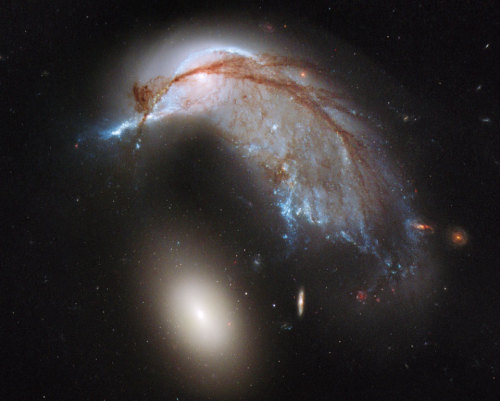
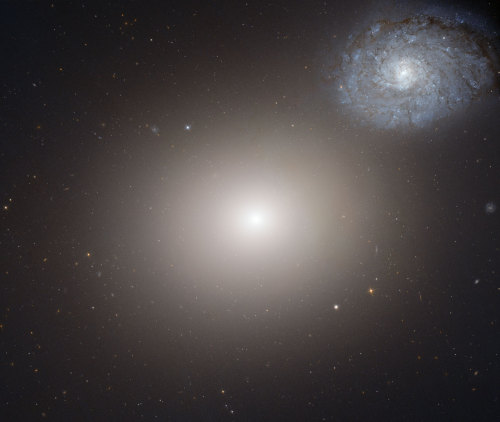
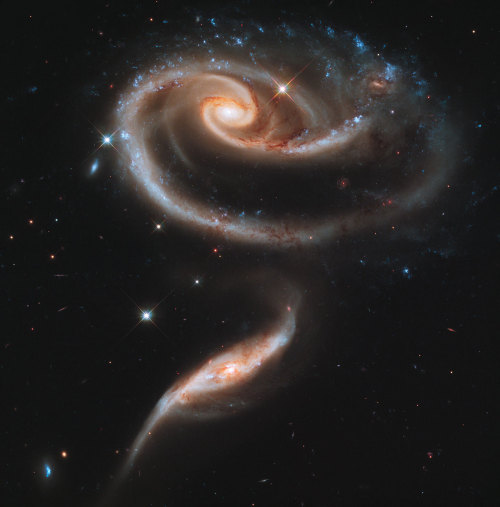
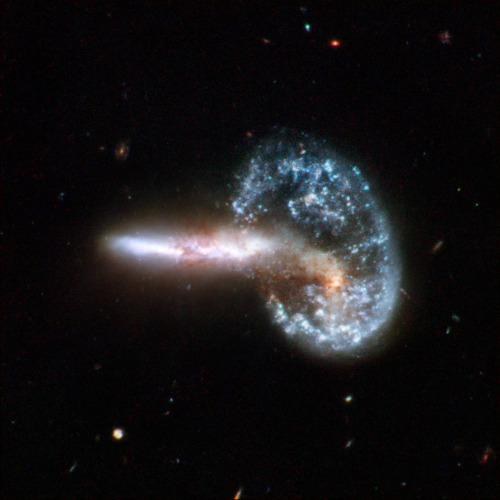

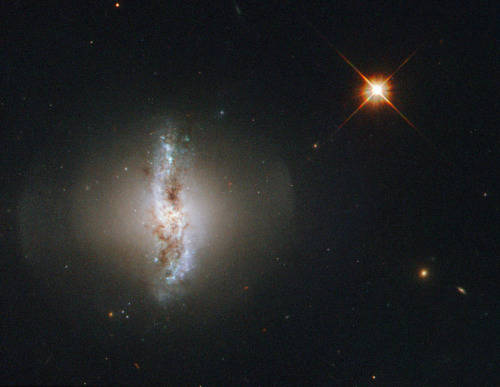
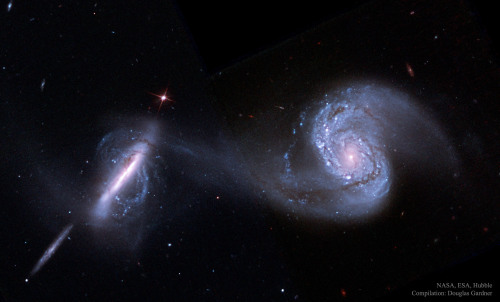



Top 10 Bizarre Galaxy Pairs From Hubble
“The Arp catalog illustrates galaxies in many different stages of a collision:
* prior to their first close pass, * in the collision process, * subsequent to an interaction but before merging, * and in the final merger stages.
Unlike ellipticals, spirals are easily disturbed, often becoming destroyed entirely by such an interaction.”
When you take a glimpse into the deep Universe, beyond the gas, dust, stars and planets of our own galaxy, you enter the realm of the galaxies. In general, they come in two types: the spirals, with neat, orderly arms, and the ellipticals, with a symmetric, bulging shape. But for everything that exists in the Universe a particular way in general, there are exceptions. In the 1960s, astronomer Halton Arp became fascinated with these exceptions, creating a catalog of 338 examples: the Atlas of Peculiar Galaxies. We now know that most of these are galaxy pairs or triplets in the process of major mergers, displaying features such as tidal disruption, stellar bridges, starbursts and occasionally a rare, ring shape.
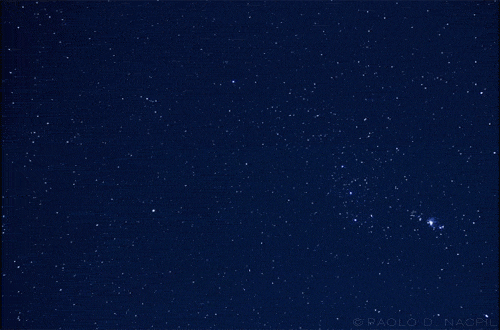

The Space Shuttle Columbia
Pause today to remember the Crew of STS-107, who all died on this day 13 years ago, February 1, 2003, when the Space Shuttle Columbia became unstable and disintegrated on re-entry over Texas. The Crew:
The Flight Commander was Rick D. Husband, a U.S. Air Force colonel and mechanical engineer, who piloted a previous shuttle during the first docking with the International Space Station on STS-96.
The Pilot was William C. McCool, a 1983 graduate of the United States Naval Academy in Annapolis, Maryland and U.S. Navy commander.
The Payload Commander was Michael P. Anderson, a U.S. Air Force lieutenant colonel. He was also a physicist and mission specialist who was in charge of the science mission.
The Payload Specialist Ilan Ramon was a colonel in the Israeli Air Force and the first Israeli astronaut.
The Mission Specialist was Kalpana Chawla, an Indian-born aerospace engineer who was on her second space mission. She was the first Indian woman in space.
The Mission Specialist was David M. Brown, a U.S. Navy captain trained as an aviator and flight surgeon.
The Mission Specialist was Laurel Blair Salton Clark, a U.S. Navy captain and flight surgeon. Clark worked on biological experiments.
The Space Shuttle Columbia was named after the poetic designation for the United States of America. This poetic name (based on Christopher Columbus, thought then as the sole discoverer of America) was meant to be both inclusive and a little bit nostalgic, in the sense that America could be embodied in a name. Clearly these seven astronauts and mission specialists embodied the best spirit of America, the inclusion of an Indian and Israeli the strongest symbol yet of what America can accomplish when unified to a common purpose. Special thought to William McCool, graduate of the USNA-I pass almost daily the ‘McCool Marker’, a memorial on the grounds of the USNA golf course to celebrate his achievements both as a Naval Aviator but also his accomplishments as a Midshipman, where he served as Captian of the Cross Country team his senior year. The marker is placed on the cross country course 16 minutes from the finish line of his fastest run on the Navy course.
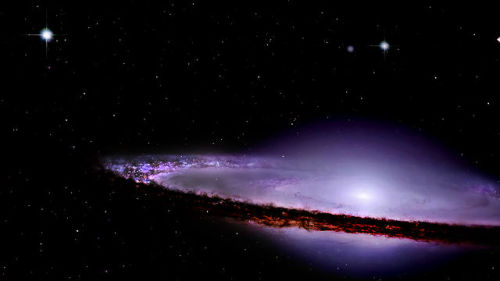
The stunning Sombrero galaxy (seriously, there should be a blog that’s just photos of the Sombrero galaxy)

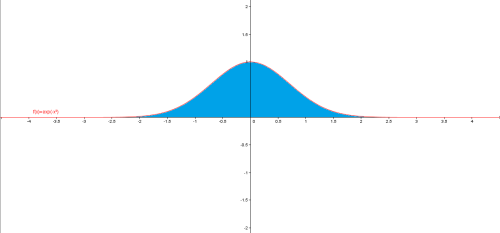
The Gaussian Integral is a beautiful integral for which the area between the e^(-x^2) and the x-axis from negative infinity to positive infinity perfectly equals the square root of pi. Image sources: 1, 2.
-
 gvndual liked this · 2 months ago
gvndual liked this · 2 months ago -
 g00melo5-art-blog reblogged this · 2 months ago
g00melo5-art-blog reblogged this · 2 months ago -
 g00melo5-art-blog liked this · 2 months ago
g00melo5-art-blog liked this · 2 months ago -
 wizardschoooldropout liked this · 3 months ago
wizardschoooldropout liked this · 3 months ago -
 masawi liked this · 3 months ago
masawi liked this · 3 months ago -
 miguel15silva98 liked this · 3 months ago
miguel15silva98 liked this · 3 months ago -
 onlyasucker reblogged this · 3 months ago
onlyasucker reblogged this · 3 months ago -
 onlyasucker liked this · 3 months ago
onlyasucker liked this · 3 months ago -
 g-oddess liked this · 3 months ago
g-oddess liked this · 3 months ago -
 thisismymotto reblogged this · 3 months ago
thisismymotto reblogged this · 3 months ago -
 therealshogun reblogged this · 3 months ago
therealshogun reblogged this · 3 months ago -
 therealshogun liked this · 3 months ago
therealshogun liked this · 3 months ago -
 descrevos reblogged this · 3 months ago
descrevos reblogged this · 3 months ago -
 mariannetheflash liked this · 4 months ago
mariannetheflash liked this · 4 months ago -
 impossiblyatomictiger-blog liked this · 4 months ago
impossiblyatomictiger-blog liked this · 4 months ago -
 s0mek1dsm0m reblogged this · 4 months ago
s0mek1dsm0m reblogged this · 4 months ago -
 mikropenisz reblogged this · 5 months ago
mikropenisz reblogged this · 5 months ago -
 tonsazuis liked this · 5 months ago
tonsazuis liked this · 5 months ago -
 the-adjustment liked this · 5 months ago
the-adjustment liked this · 5 months ago -
 strong-passion-blog liked this · 5 months ago
strong-passion-blog liked this · 5 months ago -
 curlygirlls liked this · 5 months ago
curlygirlls liked this · 5 months ago -
 lucklavie liked this · 5 months ago
lucklavie liked this · 5 months ago -
 bruneera reblogged this · 5 months ago
bruneera reblogged this · 5 months ago -
 refor-mar reblogged this · 5 months ago
refor-mar reblogged this · 5 months ago -
 kynrt reblogged this · 5 months ago
kynrt reblogged this · 5 months ago -
 kynrt liked this · 5 months ago
kynrt liked this · 5 months ago -
 jardimpoetico liked this · 5 months ago
jardimpoetico liked this · 5 months ago -
 notsubstime reblogged this · 5 months ago
notsubstime reblogged this · 5 months ago -
 notsubstime liked this · 5 months ago
notsubstime liked this · 5 months ago -
 descrevos reblogged this · 5 months ago
descrevos reblogged this · 5 months ago -
 celeste-tyrrell liked this · 6 months ago
celeste-tyrrell liked this · 6 months ago -
 call-me-copycat liked this · 6 months ago
call-me-copycat liked this · 6 months ago -
 anna1wh3q liked this · 7 months ago
anna1wh3q liked this · 7 months ago -
 omgherbalicious liked this · 7 months ago
omgherbalicious liked this · 7 months ago -
 frejasr liked this · 8 months ago
frejasr liked this · 8 months ago -
 lguiz liked this · 8 months ago
lguiz liked this · 8 months ago -
 cxivo liked this · 8 months ago
cxivo liked this · 8 months ago -
 diangeloalvaro liked this · 9 months ago
diangeloalvaro liked this · 9 months ago -
 papi-serpiente liked this · 10 months ago
papi-serpiente liked this · 10 months ago -
 ay-masakali liked this · 10 months ago
ay-masakali liked this · 10 months ago -
 lovelyalicorn reblogged this · 10 months ago
lovelyalicorn reblogged this · 10 months ago -
 arocrows42 liked this · 10 months ago
arocrows42 liked this · 10 months ago -
 lovelyalicorn reblogged this · 10 months ago
lovelyalicorn reblogged this · 10 months ago -
 lovelyalicorn liked this · 10 months ago
lovelyalicorn liked this · 10 months ago
